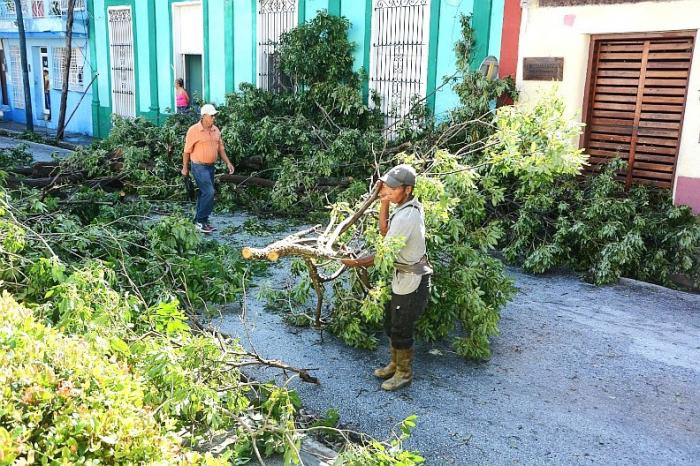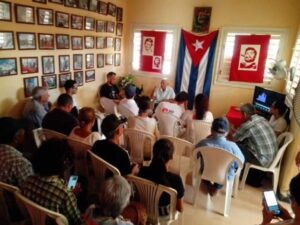The National Defence Council – headed by the First Secretary of the Central Committee of the Party and President of the Republic, Miguel Díaz-Canel Bermúdez, and by the member of the Political Bureau and Prime Minister, Manuel Marrero Cruz – evaluated the actions to accelerate the recovery in the zones affected by Hurricane Melissa.
The expanded National Defence Council continued this Monday its systematic follow-up on the progress of the works to repair the damages caused by Hurricane Melissa in Guantánamo, Santiago de Cuba, Granma and Holguín, where the recovery of electricity, water supply, telecommunications and other basic services is advancing, but much still remains to be done for their people to return to daily life.
The exchange, which was held via videoconference with the authorities of the affected territories, was headed by the First Secretary of the Central Committee of the Party and President of the Republic, Miguel Díaz-Canel Bermúdez, President of the National Defence Council. It was moderated by the member of the Political Bureau and Prime Minister, Manuel Marrero Cruz.
The re-establishment of the electricity service in the eastern region was one of the topics widely addressed. The Minister of Energy and Mines, Vicente de la O Levy, informed that in Las Tunas the service covers 99.95% of customers; in Guantánamo, 96.45%; in Holguín, 79.76%, and in Granma, 73.44%.
The re-establishment of the electrical supply in Santiago de Cuba has reached 29.23%, a figure still low due to the great damages suffered by the distribution lines and the complexity of their rehabilitation, which is why the greatest efforts are concentrated in this province.
As he explained, in the coming hours all the substations of the province should be energised by the National Electrical System (SEN), which will allow a leap in service provision.
A priority for the comrades from the electrical system is the municipality of Santiago de Cuba, with 187,000 customers, where the damages to the distribution lines are great due to fallen trees, with serious effects on posts, lines and other infrastructure.
In response to a question from the Cuban President, the Minister of Energy and Mines explained that 100% of the customers in the Hero City should have service this week; in other municipalities the situation is also complex, but in all, due to the energisation of the substations, they will have, starting this Tuesday, a determined level of service.
Santiago de Cuba is a priority for the electrical workers; brigades from other provinces will continue arriving to support the work. Currently in the eastern region, 3,746 comrades are working on the electrical lines, and more men will continue to be moved to the indomitable province.
In the municipality of Guamá, explained Vicente de la O Levy, the distributed generation engine that was moved there is already installed and functioning.
Regarding the Báguanos-Bayamo distribution line, where six high-tension towers were knocked down by the hurricane, work is proceeding without rest, including the use of equipment from the FAR due to the difficult access to them, as a consequence of the destruction left by Melissa.
In Holguín it is estimated that, by the beginning of next week, very few customers will be left without service; in Granma the seven flooded substations were recovered and the Río Cauto one is now being warmed up.
In this province a leap in service provision of around 6% is expected in the coming hours; in Guantánamo the main limitations are in the mountains and in isolated zones.
WATER SUPPLY AND OTHER SERVICES
Regarding the water supply, the president of the National Institute of Hydraulic Resources, Antonio Rodríguez Rodríguez, commented that in Las Tunas all the infrastructure is re-established.
In Holguín 83% of people receive the service through the usual means they had; in Guantánamo, 96%; in Granma, 55%, and in Santiago de Cuba, 57%; 45% through networks and the rest by tankers.
In Holguín work is being carried out on conduits, such as a new one being built of 9.5 km, and others are being repaired; equipment is also being incorporated that will allow, both here and in the rest of the territories, to increase the supply.
In Santiago de Cuba, for example, the work carried out on Quintero 1 and 2 will allow increasing the water flow by more than 1,500 litres/second, more than they had before the passage of Melissa.
At this Monday’s meeting of the National Defence Council, the subgroups of the Social Economic Organ also reported. On Food, the Minister of Internal Trade, Betsy Díaz Velázquez, commented on the assurance of rice from the basic basket, among other products, for the inhabitants of the provinces most battered by the cyclone.
It was also learned of the sending of 21 tractors and other equipment to support the recovery of agriculture in Santiago de Cuba, as well as devices for chainsaws that are being used in the cutting of fallen trees.
In the affected territories, some 13,000 hectares of crops, such as plantain, cassava and coffee, have been recovered.
At the meeting, in which the authorities of the provincial defence councils of Guantánamo, Santiago de Cuba, Granma and Holguín intervened, the representatives of the Transport, Industry, Health, Education and International Cooperation groups, among others, also reported.
It was also reported of the availability for the affected territories of tens of thousands of roofing elements, such as asbestos cement and zinc tiles, and of other construction elements.
INFORMATIVE NOTE NO. 8 FROM THE NATIONAL STAFF OF THE CIVIL DEFENCE ON HURRICANE MELISSA
It was decided starting at 17:00 hours this 10th November, to establish the Recovery Phase for the municipalities of Río Cauto and Cauto Cristo, in the province of Granma, and to normalcy the province of Las Tunas; the Granma municipalities of Pilón, Niquero, Media Luna and Campechuela; the municipalities of Maisí, Baracoa and Imías, in the province of Guantánamo, and Calixto García, in the province of Holguín.
The other municipalities affected after the passage of Hurricane Melissa will continue with the Recovery Phase, under the direction of their respective Defence Councils.
Recognition is given to the work deployed by the management organs, the media and the population, for the discipline and solidarity shown in the fulfilment of the measures directed during the preparations and the response to this event.
National Staff of the Civil Defence




